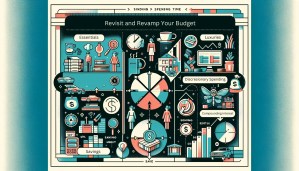- Navigating an Impending Recession: 7 Strategies for Financial Stability
- 1. Revisit Your Budget
- 2. Build an Emergency Fund
- 3. Tackle Debt
- 4. Stay Invested
- Enhanced Risk Management for Financial Stability
- 5. Invest Wisely
- 6. Reduce Monthly Bills
- 7. Job Stability and Advancement
- Crafting a Personalized Financial Blueprint
- Evaluating Your Financial Footprint
- Goal-Setting: Charting Your Financial Journey
- Strategizing Debt Freedom
- Building Your Financial Safety Cushion
- Legacy Planning: Securing Your Financial Future
- Investment: Growing Your Financial Garden
- Insuring Your Financial Path
- Monitoring and Adapting Your Financial Map
- Conclusion: Proactive Financial Management in Uncertain Times
Navigating an Impending Recession: 7 Strategies for Financial Stability
As concerns about a potential recession rise, it’s more important than ever to focus on financial preparedness and stability. Here are seven key strategies to help you navigate through these uncertain times, ensuring that you’re not just surviving, but also positioning yourself for growth and resilience.

1. Revisit Your Budget
In anticipation of a recession, it’s vital to scrutinize your budget. Differentiate essential expenses (housing, food, transportation, debt payments) from discretionary spending. Opportunities to reduce or delay discretionary spending, like postponing big purchases, can significantly boost your near-term savings.
Revisit and Revamp Your Budget
- Need vs. Want: During uncertain economic times, closely examine your budget. Separate essential expenses like housing, food, and transportation from discretionary spending.
- Frugal Spending: Small changes, such as cutting back on daily luxuries (e.g., coffee purchases), can lead to significant savings. Investing these savings can be highly beneficial in the long run due to compound interest.
Frugal Spending Habits
- Example: Cutting back on small, frequent expenses like daily coffee purchases.
- Impact: Saving $100 a month and investing it at a 12% annual return can grow significantly over time, potentially reaching a million dollars in 40 years through the power of compound interest.

2. Build an Emergency Fund
Aim to have at least three to six months’ worth of expenses in a highly liquid savings account. For sole earners or those in unstable industries, a six-month cushion is recommended. If you’re retired, having up to a year’s worth of expenses in liquid assets is advisable to avoid selling long-term investments during market downturns.
Building a Robust Emergency Fund
- Safety Net Goal: Aim to save three to six months’ worth of expenses in a liquid savings account. This is particularly crucial for sole earners or individuals in unstable job sectors.
- Fund Accumulation Strategy: Start small and regularly contribute to this fund, using additional income sources like tax refunds or bonuses.
Emergency Savings Fund
- Goal: Aim for a savings fund covering 6 to 12 months of living expenses.
- How to Achieve: Start small, if necessary, and gradually build up. Deposit any additional income, like tax refunds or bonuses, into this fund. A well-stocked emergency fund is your financial safety net during times of uncertainty, such as job loss or unexpected expenses.

3. Tackle Debt
With rising interest rates, it’s essential to address debts, particularly high-interest ones like credit cards. Debt consolidation strategies can help streamline payments and potentially reduce interest costs.
Tackling Debt in a High-Interest Environment
- Debt Reduction Focus: Paying down high-interest debts, especially credit card debts, is crucial. Debt consolidation can streamline payments and reduce overall interest costs.
- Strategies: Explore debt consolidation options to combine multiple debts into a single, more manageable loan.
Debt Management
- Goal: Pay down or consolidate high-interest debts, especially credit card debts.
- Method: Consider debt consolidation strategies to combine multiple high-interest debts into a single, lower-interest loan. This can streamline your payments and reduce the total interest paid over time.

4. Stay Invested
While it’s tempting to sell off investments during a recession, history shows that staying invested through market highs and lows is often more beneficial. Selling in a falling market can lock in losses, and it’s challenging to predict the right time to re-enter the market.
Maintaining Investments During Market Fluctuations
- Long-term Investment Strategy: Resist the urge to sell off investments during a recession. Historically, markets rebound, and staying invested could lead to recovery and growth.
- Diversification: Spread investments across various asset classes to mitigate risks.
Investment Strategies
- Diversification: Mix investments across different asset classes like stocks, bonds, and cash equivalents to mitigate risk.
- Long-term View: Maintain a long-term perspective and avoid panic selling during market downturns. Historically, markets have rebounded, and staying invested can offer the potential for recovery and growth.
Enhanced Risk Management for Financial Stability

Embracing Risk Management in Uncertain Times
Risk management is essential in personal finance, especially during economic uncertainties. It’s about safeguarding your financial well-being against unforeseen events and market fluctuations. The goal is to minimize potential losses while maximizing gains. Proper risk management can protect you from significant financial downturns.
The Power of Diversification: Spreading Your Financial Wings
Diversification involves spreading your investments across multiple asset classes, such as stocks, bonds, real estate, and commodities. This strategy minimizes the impact of losses in one asset class, as gains in other asset classes can offset those losses. Including both domestic and international assets can further diversify your portfolio.

Tailoring Your Asset Allocation: A Dynamic Approach
Asset allocation is crucial in determining your portfolio mix. This mix should align with your goals and risk tolerance. Regularly reviewing and adjusting your asset allocation helps minimize the impact of market volatility, ensuring your investments align with your changing goals and risk tolerance.
Hedging: Your Financial Safety Net
Hedging is about taking positions in investments that offset potential losses in other investments. For example, purchasing options contracts can protect against a decline in the stock market. Hedging strategies reduce the impact of market volatility on your portfolio and manage risk exposure.
Insurance: Transferring Risks for Peace of Mind
Insurance is a key component of risk management. It transfers some financial risks to an insurance company. This includes risks like losing your home in a disaster or facing death or disability. Consider types of insurance like life, health, property, and liability to protect against unforeseen events.

5. Invest Wisely
Recessions can be a good time to rebalance your portfolio. Historically, bonds and cash have outperformed stocks during recessions. High-quality corporate and government bonds typically offer higher returns during these times. Cash held in CDs and money market funds can provide a cushion against market downturns.
Investing Wisely During Economic Downturns
- Rebalancing Your Portfolio: Recessions can be opportune times to reassess and realign your investment portfolio. Consider shifting towards bonds and cash equivalents.
- Equity Building Through Homeownership: If feasible, transitioning from renting to owning a property can be a smart move, allowing you to build equity over time.
Homeownership and Equity Building
- Strategy: Shift from renting to owning a property to build equity.
- Consideration: While homeownership isn’t feasible for everyone, those who can afford it might find that mortgage payments can be comparable to or even less than rent in some areas, with the added benefit of building equity over time.

6. Reduce Monthly Bills
Negotiating your bills, especially discretionary ones, can significantly reduce your monthly expenses. Being polite yet assertive during negotiations is key. If you find this process daunting, there are services available that can negotiate on your behalf.
Minimizing Monthly Expenses
- Negotiation and Reduction: Regularly review and negotiate your bills. Utilize negotiation services or apps like BillTrim to lower your expenses.
- Subscription Management: Keep track of and eliminate unnecessary subscriptions and recurring charges.
Reducing Monthly Bills
- Tools: Use apps like BillTrim to negotiate and lower your bills.
- Method: Contact service providers to negotiate lower rates or switch to more affordable plans. Regularly review and reduce unnecessary subscriptions and recurring charges.

7. Job Stability and Advancement
Even during a recession, it’s important to seek job stability and advancement. Be adaptable to changes at work, stand out by going above and beyond your regular duties, enhance your skill set, and keep your resume updated. Building relationships and volunteering for extra projects can make you an invaluable resource to your employer.
Focusing on Career Stability and Growth
- Continual Improvement: Constantly seek to enhance your skills and value in the workplace. Be adaptable and open to new opportunities for career advancement.
- Networking and Visibility: Build strong workplace relationships and volunteer for projects, making you a more indispensable part of your team.
Career Advancement
- Approach: Continuously seek better employment opportunities, even if you are currently employed.
- Mindset: Avoid complacency. Stay aware of the job market, update your skills, network actively, and be open to new opportunities that may offer better compensation or career growth.
Crafting a Personalized Financial Blueprint

Evaluating Your Financial Footprint
Begin by assessing your current financial situation. Review your last 6 to 12 months of bank statements, categorize expenses, and identify areas for spending reduction. This will give you a clear picture of where you can cut down on costs.
Goal-Setting: Charting Your Financial Journey
Establish S.M.A.R.T goals to provide direction in your financial decisions. These goals should be specific, measurable, attainable, relevant, and time-bound. Setting both short-term and long-term goals helps maintain motivation and provides a consistent direction.
Strategizing Debt Freedom
Address your debts, focusing on those with high interest rates. Consider consolidating multiple debts into a single loan if necessary. A well-thought-out debt plan is crucial for financial progress.
Building Your Financial Safety Cushion
An emergency fund is a financial safety net. Aim to save enough to cover 3 to 6 months’ worth of fixed expenses. This fund is vital for unexpected financial shocks, like job loss or sudden illness.
Legacy Planning: Securing Your Financial Future
Estate planning ensures your family’s protection. It includes a will, healthcare directives, power of attorney, and trust information. While not the most exciting task, it’s crucial for long-term peace of mind.
Investment: Growing Your Financial Garden
Focus on building wealth through savings and investments. Consider factors like retirement age, desired lifestyle, health, and current savings rate. If new to investing, seek advice from financial advisors.

Insuring Your Financial Path
Ensure you have the right insurance coverage. This includes home, car, health, and life insurance, protecting you from unforeseen risks without draining your savings.
Monitoring and Adapting Your Financial Map
Regularly review and update your financial plan. Life changes such as marriage, childbirth, or buying a home require adjustments in your plan. Consistent tracking ensures you are on track towards your financial goals.

Conclusion: Proactive Financial Management in Uncertain Times
Incorporating these strategies not only equips you to handle the challenges of a recession but also sets a foundation for future financial growth and stability. Adopting a proactive and comprehensive approach to managing your finances is crucial in navigating and thriving during economic downturns. Remember, in the face of adversity, being prepared and adaptable can make all the difference in securing your financial well-being.
- The Credit Pros: Enhancing Your Financial Journey
- Embrace Everyday Adventures with Mounteen: Your Gateway to an Exciting Life!
- Accessible National Transportation Resources for Seniors and Individuals with Disabilities
- Loans Demystified: Your Guide to Borrowing Wisely
- Credit Card Limit Calculator: How Much Can I Qualify For?
















Fantastic Read heres my feedback ! …
Thanks – PomKing
http://www.pomeranianpuppies.uk